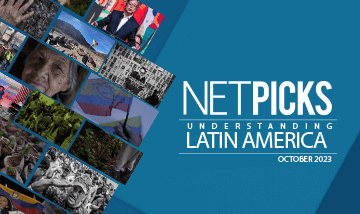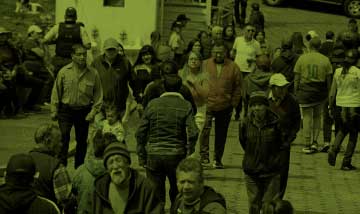Índice
Understanding Latin America
Dear friends, while we all wait with bated breath for the results of the U.S. presidential elections, here are five important articles that may briefly take your mind off events in the North: 1.Brazil & U.S.: How Presidents Trump and Bolsonaro weakened the health defenses of Latin America by targeting Cuban doctors just before the pandemic. 2. Chile: a landslide vote approved the re writing of the country’s neoliberal constitution. 3. Bolivia: a critical analysis of the recent presidential election that returned Evo Morales’ MAS to power. 4. The Amazon: a new report shows mining is present on 20% of indigenous land. 5. Colombia: analyzing the causes of the dramatic increase in killing of social leaders.
.
HOW TRUMP AND BOLSONARO BROKE LATIN AMERICA’S COVID-19 DEFENSES
With a third of the world’s deaths, Latin America has suffered more from the Covid-19 pandemic than any other region of the world. But statistics don’t tell the whole story. The devastation wrought by COVID-19 is also a tale of two Presidents, Jair Bolsonaro and Donald Trump, and how the two men, fierce opponents of the Latin American left, took aim at the doctors Cuba sends around the world. Between them Trump and Bolsonaro contrived to drive out 10,000 Cuban doctors and nurses from vulnerable areas of Brazil, Ecuador, Bolivia and El Salvador; many left only months before the pandemic hit, and were never replaced. The two leaders also attacked the Pan-American Health Organization (PAHO), the international health agency with the greatest capacity to fight the virus, citing its involvement with the Cuban medical program, and using spurious accusations of forced labor and human trafficking. With help from Bolsonaro, Trump almost bankrupted the agency by denying funding at the height of the outbreak, while with prompting from Trump, Bolsonaro made hydroxychloroquine the centerpiece of Brazil’s response to the pandemic. As the authors note, weak health systems and overcrowded cities had already made Latin America inherently vulnerable, but by driving out doctors, blocking assistance, and pushing false cures, Trump and Bolsonaro made a bad situation worse.
David D. Kirkpatrick and José María León Cabrera, October 27th, 2020.
https://www.nytimes.com/2020/10/27/world/trump-bolsonaro-coronavirus-latin-america.html
.
BURYING PINOCHET
Fifty years ago, the Popular Unity (UP) coalition led by Salvador Allende assumed office in Chile, and set out on its historic, if interrupted, path to democratic socialism. In light of last Sunday’s (October 25th) vote to rewrite Chile’s constitution, the anniversary assumes even greater significance. But there are differences. While Allende worked within the party political structure, the new movement that has promoted and fought for the right to re-write is much broader in scope. It is ordinary citizens, debating in neighborhood squares in Santiago and other parts of the country, who have assumed the role of reflecting on the past and planning for the future, while traditional parties have been less in evidence. And while minor modifications have been made to the 1980 ‘Pinochet’ constitution, the document remains a major obstacle to changing important aspects of the country’s social and economic life. Reducing inequity is fundamental in areas such as pensions, recognition of indigenous peoples and women’s rights, and, in particular, the constitution’s role in entrenching the country’s neoliberal economic model. And as the author points out, in many ways that’s exactly what Pinochet intended. A 155-person citizen-elected, citizen-led assembly, with an historic equal representation of men and women, will be elected by national vote in April 2021. A vote on the final draft will take place in 2022. The possibilities for real change are now greater than at any time since Allende took power.
Joshua Frens-String, October 27th, 2020.
https://nacla.org/news/2020/10/28/burying-pinochet
.
WHY LUCHO & DAVID WON THE BOLIVIAN ELECTIONS
The overwhelming victory of MAS (Movimiento Al Socialismo) candidates Luis Arce y David Choquehuanca in the recent Bolivian presidential election, was due in large measure to the ineptitude and corruption of the interim administration of Jeanine Añez, as well as its persecution of MAS supporters and legislators in the aftermath of the 2019 coup. But welcome as it may be, the return to power of Evo Morales’ party needs to be seen within a context that is both internally and externally complex, and not necessarily positive. As the author points out, although the presidential candidacy of Choquehuanca was opposed by former President Evo Morales, the recent MAS victory was due in large part to indigenous and campesino support for his former foreign minister. Control over the governing party could therefore be seen an area in dispute, implying the potential for discord. To add to the MAS’ difficulties, the country’s financial situation, complicated even further by the COVID-19 pandemic, is not as strong as it was five years ago, implying changes to the previous model. So while the election victory can rightly be celebrated, and brings a welcome return to more egalitarian social and economic practices, the road ahead is littered with social, environmental, and political potholes. The MAS will consequently need to navigate skillfully to make sure its victory and its place as an important progressive force can be consolidated.
Pablo Solón, October 19th, 2020.
https://systemicalternatives.org/2020/10/19/why-lucho-david-won-the-bolivian-elections/
.
MINING COVERS MORE THAN 20% OF INDIGENOUS TERRITORY IN THE AMAZON
A new World Resources Institute (WRI) report reveals that mining has impacted more than 20% of indigenous land in the Amazon, being present in over one thousand territories and 174,000 square miles of the six countries studied: Bolivia, Brazil, Colombia, Ecuador, Guyana and Peru. The analysis also reveals that forests disappear up to three times faster in areas with mining, while the often toxic chemicals used by miners, including mercury, have polluted at least 30 rivers in the world’s largest rainforest. During the COVID-19 pandemic the problem has only become worse, as governments do little to protect and enforce the rights of indigenous communities that are important protectors of the forest. When their rights are respected, say the authors, deforestation rates are two or three times lower, but the presence of mining erases much of that advantage. One problem is that indigenous people themselves sometimes participate in mining as they need money for food and the education of their children. Greater investment in these communities could make mining less attractive, says a WRI spokesperson, stating that “Rather than framing Indigenous peoples as poor and primitive, we invite political and economic actors to partner with our peoples.”
John C. Cannon, October 9th, 2020.
https://news.mongabay.com/2020/10/mining-covers-more-than-20-of-indigenous-territory-in-the-amazon/
.
UNDERSTANDING THE KILLING OF SOCIAL LEADERS IN COLOMBIA DURING COVID-19
The number of deaths attributable to the Colombian armed conflict decreased significantly both during peace negotiations with the Revolutionary Armed Forces of Colombia (FARC) and immediately after the signing of the Peace Accord. More recently however, implementation issues and the presence of other armed actors have brought new threats for social leaders and vulnerable groups. The threats have become more acute during the COVID-19 crisis, the assassination of social leaders and members of vulnerable groups rising dramatically in 2020. In April 2020 an average of around six social leaders and members of vulnerable groups were reported killed each week, while this increased to over ten per week by the end of August. The killings generally concern farmers, indigenous and Afro-descendant people, as well as current and former members of government, political parties, journalists, women, teachers, students, and LGBT people, while former guerilla combatants are also in the line of fire. But despite recognizing that the increased violence against social leaders and vulnerable groups is a serious issue, little effort has been made to uncover links between systematic killings and specific armed groups. The state should be actively investigating these killings and bringing in measures that safeguard the rights of social leaders and vulnerable groups, but despite major social protests the peace process has stalled under President Ivan Duque, and the killings go on.
Carolina Castro, María del Pilar López Uribe, Fernando Posada, Bhavani Castro, Roudabeh Kishi. October 6th , 2020.
https://blogs.lse.ac.uk/latamcaribbean/2020/10/06/understanding-the-killing-of-social-leaders-in-colombia-during-covid-19/





